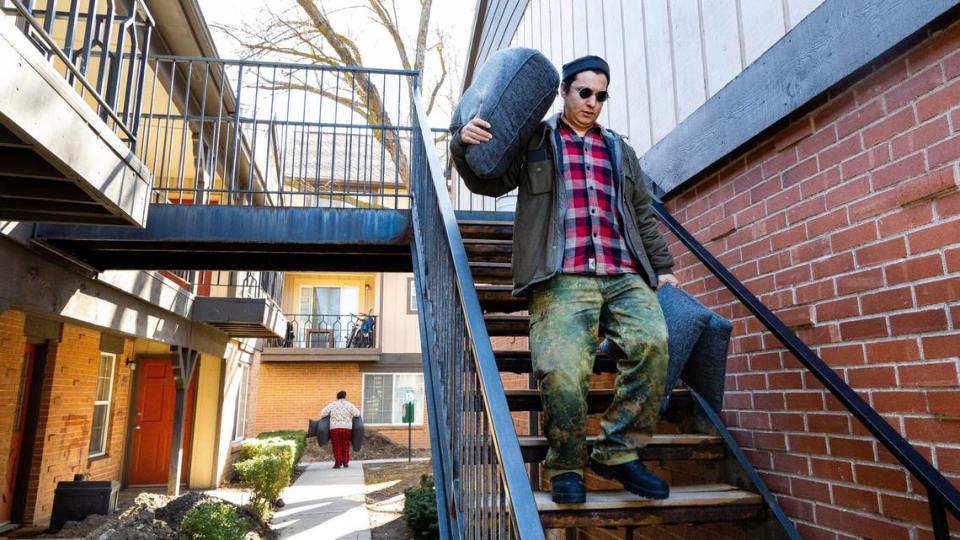What new report says about Idaho’s worsening housing shortage for those who need it most
Idaho has too few housing options to support low-income families, a new study has found.
A nationwide study by the National Low-Income Housing Coalition, a nonprofit dedicated to preserving low-income housing, reported there were 7.3 million more extremely low-income renters in the United States in 2021 than there were affordable homes. They included a section on each state, breaking down what those numbers meant for Idaho.
Using data from the U.S. Census Bureau, the study found that Idaho had 39,722 extremely low-income households that year, but only 15,012 affordable rental homes available to them. For every 100 households with extremely low incomes, there were just 38 affordable and available rental homes or apartments.
Between 2019 and 2021, the number of affordable housing units increased by 3%, which was not enough to keep pace with the 8% increase in extremely low-income households.
“Extremely low-income households,” according to the coalition, are those with “incomes at or below either the federal poverty guideline or 30% of the area median income – whichever is greater.” The maximum amount a family of four could make in Idaho and still be considered extremely low-income was $26,500 in 2021.
The coalition considered a house or apartment affordable if a family spends no more than 30% of its income renting it.
Extremely low-income households made up 20% of Idaho’s total households. Among those in this bracket, 36% were in the labor force, 32% were seniors, 20% were disabled, 2% were in school, 1% were single care givers, and 9% did not fall into any of those categories.

Families face hard choices when rent goes up
When lower- to middle-income families have to put more than a third of their income toward housing, it takes away from other areas in their budget.
“Some of those basic necessities might include things like nutritious food, going to a doctor’s appointment, purchasing medication that month, or even putting gas in your car to get to work,” Kendra Knighten, policy associate at the Idaho Asset Building Network, told the Idaho Statesman by phone. “A lot of us at some point in our lives have had to make this choice, but once you start having to make that choice consistently, those are choices that can have some really significant impacts on the health and well-being of the individual in that family and the entire household.”
The report attributed the increase in disparity to economic repercussions from the COVID-19 pandemic and significant rent increases.
“As households lost income and rental prices increased, the number of extremely low-income households increased, while the number of units affordable to them decreased,” the study said.
Fewer affordable rental options means more evictions
Zoe Ann Olson, executive director of the Intermountain Fair Housing Council, has seen how difficult it is for many in Idaho to find housing. The nonprofit received a federal grant last year to provide legal aid in evictions cases, particularly for those known as “mass evictions” involving four or more tenants who are forced to leave a rental property because of significant rent increase, uninhabitable conditions, construction or a landlord who purposely makes a tenant’s living situation difficult in order to get them to leave, Olson told the Statesman.
Right now, the nonprofit is providing assistance in 14 mass evictions across Idaho, including four in the Treasure Valley. The Intermountain Fair Housing Council says it has helped Idahoans access nearly $2 million in rental assistance and hotel vouchers in the last year.
“This emergency rental and voucher assistance is a life saver when tenants are facing eviction or sharp rent increases, but it is not enough when we have over 14 mass evictions throughout Idaho, and there are no shelters and little to no affordable, accessible housing for those living below 100% of (area median income) in most counties,” Olson said in a news release.
How to get help
If someone you know is struggling to pay rent or fight an eviction, Jesse Tree or the Intermountain Fair Housing Council may be able to help with rent assistance, hotel vouchers, legal aid and advice.
Jesse Tree
Jesse Tree can provide a case manager to anyone with an eviction court date. The case manager supports the tenant and can arrange for rental assistance.
Phone: (208) 383-9486
Email: office@jessetreeidaho.org
Website: https://www.jessetreeidaho.org/resource-library
Intermountain Fair Housing Council
The Intermountain Fair Housing Council offers housing information and referrals, housing counseling and assistance with mediating, and or filing fair-housing complaints.
Phone: (208)-336-5353 or (208) 383-0695 or 1-800-632-5125 (toll-free) and 1-800-717-0695 (toll-free)
Email: contact@ifhcidaho.org
Website: https://ifhcidaho.org/
Idaho Legal Aid
Idaho Legal Aid gives free legal advice to tenants facing problems with housing like evictions, repairs, security deposits or housing discrimination. Its advice line is open from 10 a.m. to 12 p.m. and 2 to 4 p.m. Monday through Thursday.
Phone: 208-746-7541
Apply for help online: https://www.idaholegalaid.org/node/2413/apply-legal-assistance
CATCH
CATCH runs two rapid-rehousing programs. The Linda Fund helps connect families to permanent housing and pays for the deposit and first month of rent.
Contact CATCH in Ada County from 10 a.m. to 3 p.m. Monday through Friday by calling 208-495-4240 or visiting the office at 503 S. Americana Blvd., Boise 83702, or email at ourpathhome@catchprogram.org. To contact CATCH in Canyon County, call 208-495-5688 or email accesspoint@catchprogram.org.
More information on shelters, food banks, where to donate and more can be found at bit.ly/405UAWZ.
A more extensive list of legal and mediation assistance can be found at bit.ly/3LEjGYM

